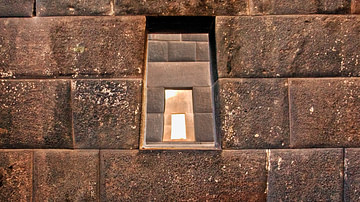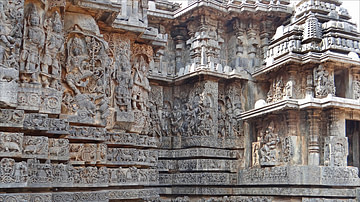Search
Search Results

Definition
Byzantine Architecture
The architecture of the Byzantine Empire (4th - 15th century CE) continued its early Roman traditions but architects also added new structures to their already formidable repertoire, notably improved fortification walls and domed churches...

Definition
Hindu Architecture
Hindu architecture evolved over the centuries from simple rock-cut cave shrines to massive and ornate temples which spread across the Indian sub-continent and beyond, forming a canonical style which is still adhered to today in modern Hindu...

Definition
Gupta Architecture
The Gupta Dynasty (4th-6th century) in North Central India saw the first purpose-built Hindu (and also Buddhist) temples which evolved from the earlier tradition of rock-cut shrines. Adorned with towers and elaborate carvings, these temples...

Definition
Ancient Korean Architecture
The architecture of ancient Korea is epitomised by the artful combination of wood and stone to create elegant and spacious multi-roomed structures characterised by clay tile roofing, enclosures within protective walls, interior courtyards...

Definition
Phoenician Architecture
Phoenician architecture is typified by large temples with double-columned facades approached by a short staircase, enclosed sacred spaces containing cube-like and open-fronted shrines, and such large-scale engineering projects as dams and...

Definition
Shinto Architecture
The architecture of the 80,000 Shinto shrines in Japan varies depending on geographical location, the deity worshipped, and the date of foundation. The earlier Shinto shrines tend to be simpler and less decorative affairs than those which...

Definition
Inca Architecture
Inca architecture includes some of the most finely worked stone structures from any ancient civilization. Inca buildings were almost always practical and pleasing to the eye. They are also remarkably uniform in design with even grand imperial...

Definition
Minoan Architecture
The unique contribution of the Minoan civilization to European architecture is possibly most evident in the great palace structures of the major Minoan centres of Knossos, Phaistos, Malia and Zakros. Perhaps influenced by Egypt and the Near...

Article
Hoysala Architecture
The Hoysala era (1026 CE – 1343 CE) was marked by illustrious achievements in art, architecture, and culture. The nucleus of this activity lay in the present day Hassan district of Karnataka, India. The most remarkable accomplishment of this...

Article
Gothic Cathedrals: Architecture & Divine Light
Gothic cathedrals are some of the most recognizable and magnificent architectural feats. With soaring towers and softly filtered light streaming through stained glass windows, everything about the Gothic cathedral is transportive and ethereal...